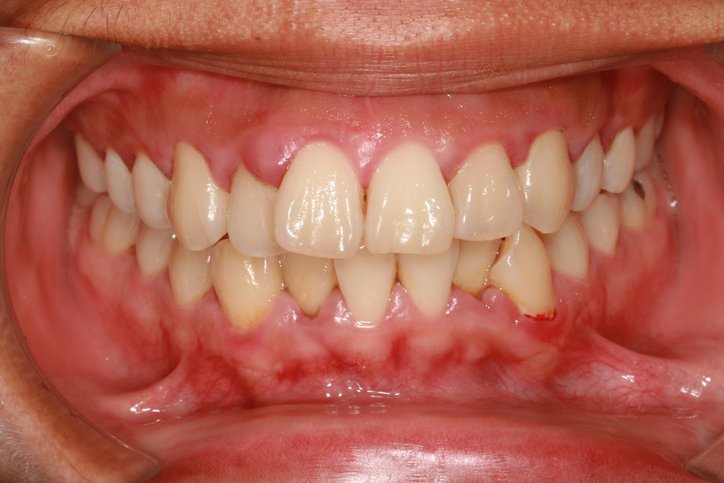Contents:
- Medical Video: Top 5 Symptoms of Gum Disease
- Bleeding gums can be a sign of various diseases
- 1. Gingivitis
- 2. Periodontitis
- 3. Vitamin deficiency
- 4. Leukemia
- 5. Hemophilia
- 6. Thrombocytopenia
- 7. Diabetes
- 8. HIV (Human Immunodeficiency Virus)
- What can I do if the gums bleed?
Medical Video: Top 5 Symptoms of Gum Disease
Often experience bleeding gums? During this time maybe you just think of small things. Often, you think bleeding gums occur because you brush your teeth too hard. But, be careful, bleeding gums can also be a sign of various diseases. It could be that bleeding gums are a sign of a serious illness, such as HV, leukemia, or diabetes.
Bleeding gums can be a sign of various diseases
Often, bleeding gums are a sign of gum disease. Usually this happens because there is too much plaque on your teeth. However, it turns out that bleeding gums can be a sign of other diseases, such as:
1. Gingivitis
Gingivitis or inflammation of the gums is one of the diseases in the mouth that make your gums more sensitive and prone to bleeding. Gingivitis can develop from plaques that attach too long to the gum line. In addition to bleeding gums, gingivitis is also characterized by swelling of the gums and pain around the gums.
2. Periodontitis
Periodontitis can occur when gingivitis is left and has worsened or in other words periodontitis is an advanced disease of gingivitis. This periodontal disease causes infection of the gums, jawbone, and connective tissue between the teeth and gums. Periodontitis can cause your teeth to stretch or date.
3. Vitamin deficiency
Bleeding teeth can also be a sign that you are experiencing a vitamin deficiency, especially vitamin C and vitamin K. Both of these vitamins are needed in blood clotting. The lack of these two vitamins will not occur if your food intake containing vitamin C and vitamin K is fulfilled. Some food sources that contain vitamin C are oranges, tomatoes, kiwi, broccoli, and potatoes. Meanwhile, foods containing vitamin K are spinach, kale leaves, lettuce, soybeans, and olive oil.
4. Leukemia
One sign of leukemia (blood cancer) is bleeding gums. This can happen because leukemia patients experience a lack of normal blood cells. In leukemia, abnormal blood cells are produced by the spinal cord. These abnormal blood cells can then replace normal blood cells. As a result, the body has difficulty fighting infection, controlling bleeding, and flowing oxygen.
5. Hemophilia
Other blood-related diseases that also have signs of bleeding gums are hemophilia. Hemophilia is a bleeding disorder that can be reduced. This disease causes abnormal or excessive bleeding and poor blood clots. Bleeding gums or other bleeding symptoms can occur in hemophilia because of a blood clotting disorder.
6. Thrombocytopenia
One sign of tombocytopenia is bleeding gums. Thrombocytopenia or low blood platelet counts can result in your body not being able to freeze blood perfectly if you have a wound. Thrombocytopenia can make you experience severe bleeding.
7. Diabetes
Diabetes has a reciprocal effect on gum disease or bleeding in the gums. Diabetes can be a cause of gum disease or diabetes can also be aggravated by gum disease. Diabetes can weaken the strength of microbes in the mouth against bacteria, so bacteria in the mouth can easily form dental plaques. In addition, high blood sugar levels in diabetics can make gum disease worse. On the other hand, gum disease can also make diabetes more difficult to control.
If your gums bleed and bleeding is abnormal, the gums are red and swollen, bad breath, teeth are stretched, or the gums are away from the teeth so the teeth look longer, you should immediately check with your dentist.
8. HIV (Human Immunodeficiency Virus)
HIV is a disease that weakens a person's immune system. One part of the body affected by HIV is the mouth. People with HIV usually have problems with their mouth, one of which is bleeding gums. Bleeding gums can occur because they have a weak immune system. In addition, people with HIV usually don't take good care of their teeth.
What can I do if the gums bleed?
Maintaining your oral health is the first thing you can do to treat bleeding gums. Brushing your teeth properly and regularly every day is the key to maintaining your oral health. Brush your teeth twice a day, which is after breakfast and before bed. Don't forget to use a soft toothbrush to brush your teeth and brush your teeth slowly.
Also, visit your dentist every six months. The doctor will check and clean your teeth. Regular dental examinations can prevent you from developing dental and gum disease. Your doctor may recommend that you use an antiseptic mouthwash to reduce the amount of plaque that forms in your teeth. However, don't use mouthwash that contains alcohol, this will make your gum problems worse.
If your gums are swollen and start bleeding, you can rinse with warm water mixed with salt. This will help cure it. You can also press your bleeding gums directly with gauze with ice water, this can reduce bleeding in your gums.
READ ALSO
- 9 Tooth Brushing Mistakes that You Do Most Often
- Revealing the Benefits of Salt Water for Oral Health
- Steps to Brushing Your Teeth Correctly












